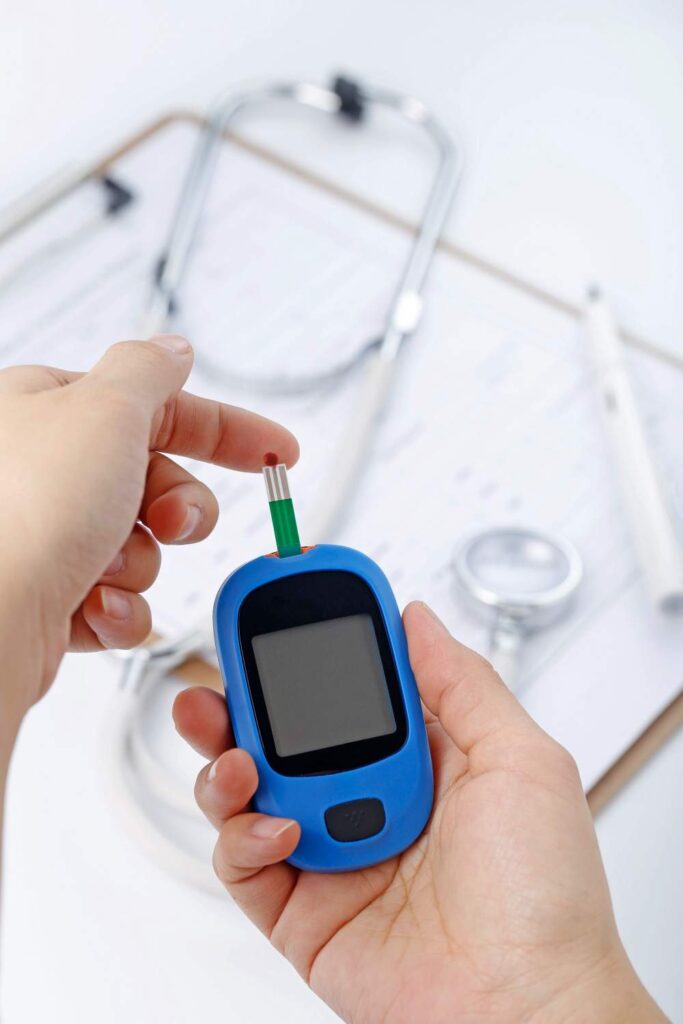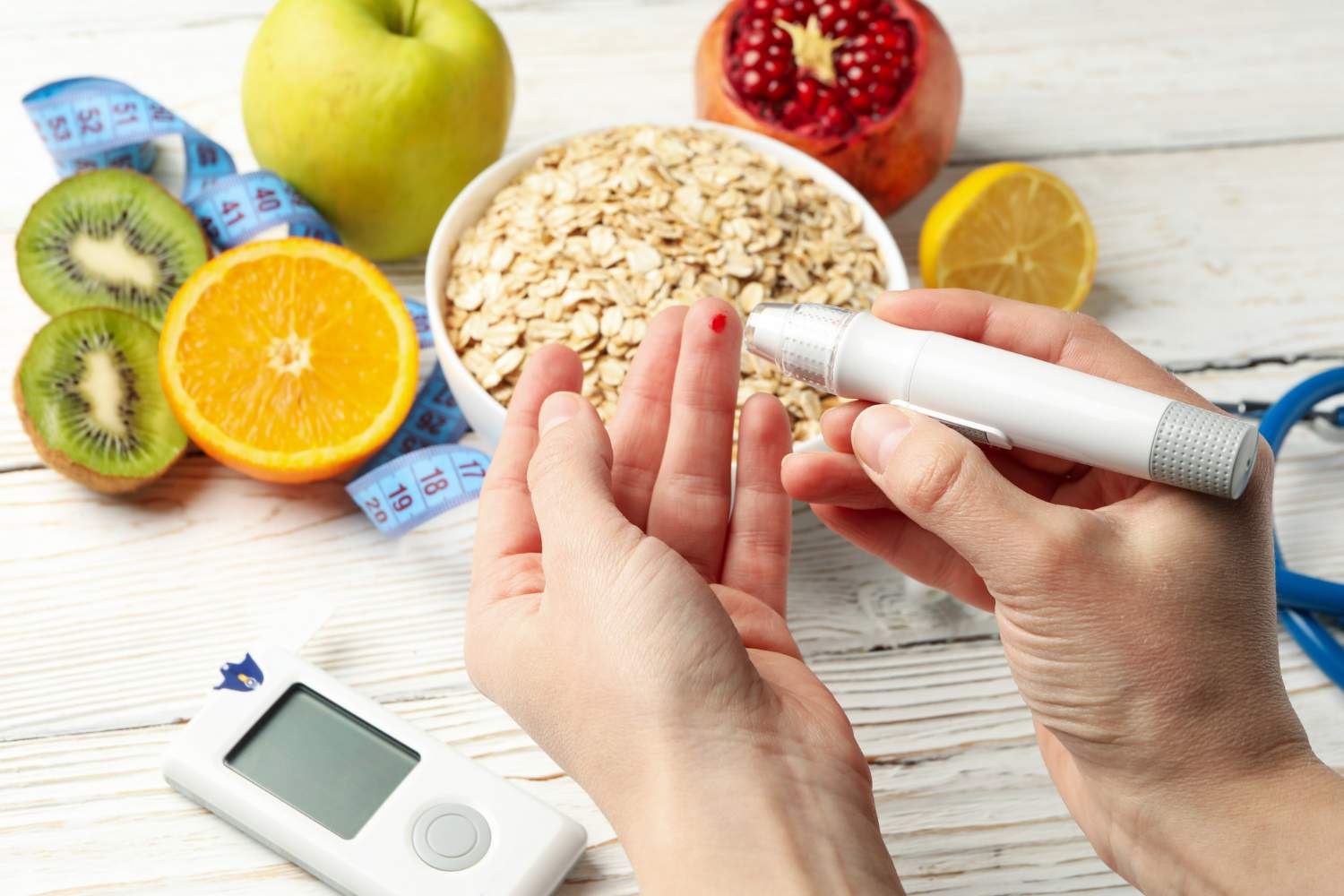Decoding Diabetes with Dietitian Garima

Diabetes is a chronic health condition in which the body has difficulty producing or using insulin, a hormone that regulates blood sugar levels. There are two main types of diabetes: type 1 diabetes and type 2 diabetes.
Type 1 diabetes is an autoimmune disease in which the body attacks and destroys the cells that produce insulin, leading to a complete lack of insulin in the body. Type 1 diabetes is typically diagnosed in childhood or adolescence and requires regular insulin injections to regulate blood sugar levels.
Type 2 diabetes is the most common form of diabetes and is characterized by insulin resistance, meaning the body is unable to effectively use insulin to regulate blood sugar levels. This can lead to elevated blood sugar levels and an increased risk of health problems over time.
Both types of diabetes can lead to serious health complications, including heart disease, nerve damage, kidney damage, and vision loss. Maintaining healthy blood sugar levels through diet, exercise, and medication can help prevent or delay the development of these complications.
Unveiling Diabetes Symptoms with Dietitian Garima
Unveil the Clues Your Body Provides: Understanding Diabetes Symptoms. With guidance from Dietitian Garima, a Leading Online Expert in Diabetes Management, explore the indicators that can signify the presence of diabetes.
Recognize these signals to take proactive steps towards your health.
Increased thirst and frequent urination: As the body tries to rid itself of excess sugar, individuals with diabetes may experience increased thirst and a need to urinate frequently.
Fatigue: Elevated blood sugar levels can interfere with the ability of cells to use glucose for energy, leading to feelings of fatigue and weakness.
Blurred vision: High blood sugar levels can cause changes in the shape of the lens in the eye, leading to blurred vision.
Slow-healing cuts and sores: Elevated blood sugar levels can impair circulation and reduce the body’s ability to fight infections, leading to slow-healing cuts and sores.
Numbness or tingling in the hands and feet: High blood sugar levels can damage nerves, leading to numbness or tingling in the hands and feet.
Unintentional weight loss: Despite increased calorie intake, individuals with uncontrolled diabetes may experience unintentional weight loss due to the body’s inability to effectively use glucose for energy.
Prioritize Your Well-Being with Dietitian Garima, Your Trusted Online Partner in Diabetes Management. Equipped with knowledge about diabetes symptoms, you can embark on a path towards better health. Reach out to us to gain control over your health journey.
Expert Tips to control Diabetes
Empower Your Journey to Diabetes Control with Practical Tips.
With guidance from Dietitian Garima, a Trusted Online Expert in Diabetes Management, discover actionable steps and lifestyle changes that can contribute to effective diabetes control and improved overall well-being.
Here are some dietary guidelines that can help individuals with diabetes:
Control portion sizes: Consuming smaller, more frequent meals can help regulate blood sugar levels and avoid spikes in insulin levels.
Choose whole, unprocessed foods: Whole, unprocessed foods such as fruits, vegetables, whole grains, lean proteins, and healthy fats can help regulate blood sugar levels and reduce the risk of health complications.
Limit added sugars: Foods high in added sugars can cause rapid spikes in blood sugar levels and contribute to weight gain.
Incorporate healthy fats: Foods high in monounsaturated and polyunsaturated fats, such as nuts, seeds, and avocados, can help regulate blood sugar levels and reduce the risk of heart disease.
Choose low-glycemic carbohydrates: Low-glycemic carbohydrates, such as whole grains and legumes, are broken down more slowly in the body and can help regulate blood sugar levels.

Take Charge of Your Diabetes Journey with Dietitian Garima, Your Online Companion for Diabetes Management. Embrace these personalized diabetes control tips and embark on a transformative path towards balanced blood sugar levels.
Reach out today to start your journey towards a healthier you.
Kitchen's Diet- Best online diet clinic

Expertise
- Trained and competent
- With over a decade in the industry under my belt.
- Received numerous accolades in the fields of healthcare and lifestyle
- Global lifestyle revolution, affecting 5+ countries
- India's go-to nutritionist and lifestyle expert

Diet & Lifestyle
- Tailored Calorie & restriction free diet plans
- No Synthetic Supplements- All Home prepared foods
- No Dieting- Maintain or enhance your present level of health
- Nothing fancy or pricey - Simple Daily meals
- Focused on Nurtition Content- Not Just Calorie Count

Client
- No tricks. No empty assurances or pledges. Prioritize long-term effects
- Get cared like family. Make it a two-way street.
- Help by phone, chat, and email: 9am – 8pm IST (Mon-Sat)
- Diet & Lifestyle Coaching
- Program comes with maintenance plan
A Journey of Success and Empowerment
Your Diabetes Questions, Answered by Dietitian Garima
Diabetes is a condition in which the body has difficulty regulating the level of glucose (sugar) in the blood. This can lead to high blood sugar levels, which can cause a range of health problems over time.
There are two main types of diabetes: type 1 and type 2. Type 1 diabetes is an autoimmune condition in which the body’s immune system attacks and destroys the cells in the pancreas that produce insulin. Type 2 diabetes is a metabolic disorder in which the body becomes resistant to insulin or the pancreas produces too little insulin.
The symptoms of diabetes can vary, but may include frequent urination, excessive thirst, blurred vision, slow wound healing, and fatigue.
Diabetes is diagnosed through a combination of physical examination, blood tests, and a patient’s medical history. A doctor may perform a fasting blood glucose test or an oral glucose tolerance test to diagnose the condition.
No, diabetes cannot be cured. However, with proper treatment and management, individuals with diabetes can effectively manage their condition and reduce their risk of developing complications.
Diabetes is treated with a combination of lifestyle changes, medication, and insulin therapy. This may include changes to diet, exercise, and stress management, as well as taking oral medications or insulin injections to regulate blood sugar levels.
Diet is an important factor in managing diabetes. Individuals with diabetes should aim to eat a balanced diet that is high in fiber, low in saturated and trans fats, and contains plenty of fresh fruits and vegetables. They should also limit their intake of sugar and processed foods.
Yes, physical activity can help manage diabetes by improving insulin sensitivity and regulating blood sugar levels. Regular exercise, such as brisk walking or cycling, is recommended for individuals with diabetes.
If left untreated or poorly managed, diabetes can lead to a range of complications, including heart disease, stroke, nerve damage, kidney disease, and vision loss.
Individuals with diabetes should monitor their condition regularly by monitoring their blood sugar levels, seeing their doctor regularly, and maintaining a healthy lifestyle. They should also be aware of any changes in their symptoms and report any concerns to their doctor promptly.
You’ll get weekly health tips, blog updates and my best wellness advice, because when you like us stick together, anything is possible.
We swear, we never spam on your mail. Just share and grab the exciting offers.
Download your free Ebook now!
